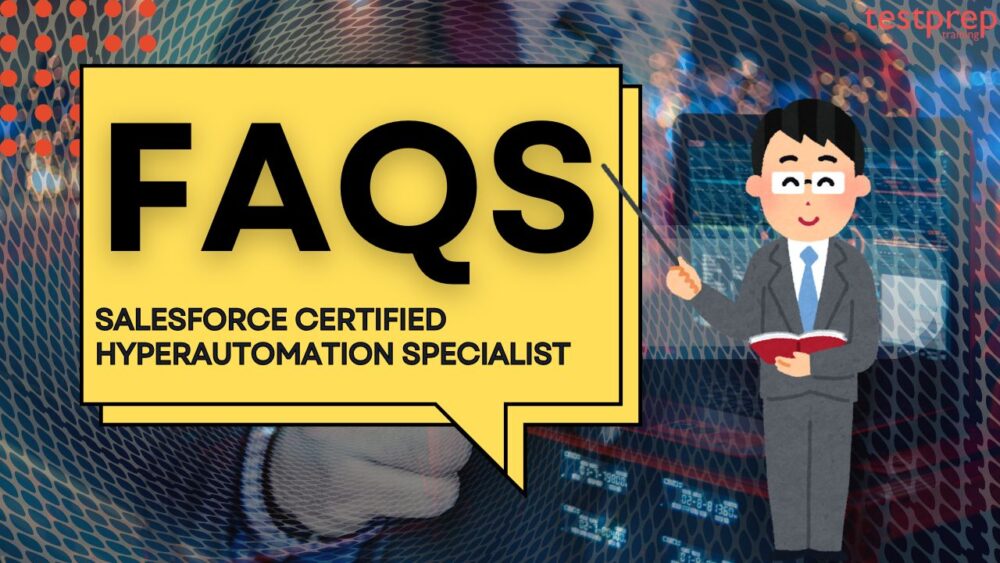Salesforce Certified Hyperautomation Specialist Exam FAQs

How many questions will be there in the Salesforce Certified Hyperautomation Specialist Exam?
The Salesforce Certified Hyperautomation Specialist Exam consists of 60 multiple-choice questions, with a time limit of 90 minutes to complete.
What is the passing score for the Salesforce Certified Hyperautomation Specialist Exam?
The passing score for the Exam is 70% and above.
What is the knowledge requirement for the exam?
Candidates for the Salesforce Certified Hyperautomation Specialist certification should have the expertise to:
- Design and execute solutions using best practices across all phases of a hyperautomation project’s lifecycle.
- Develop, manage, and implement APIs to support automated integrations in hyperautomation projects with the MuleSoft Anypoint Platform.
- Utilize Anypoint Exchange for reusing hyperautomation components.
- Automate business processes within hyperautomation projects using MuleSoft Composer.
- Implement automation of human tasks using MuleSoft Robotic Process Automation (RPA).
- Deliver automated processes through Salesforce Flow.
- Manage and coordinate complex business processes in hyperautomation projects using Flow Orchestration.
What are the target job roles for the Salesforce Certified Hyperautomation Specialist Exam?
Typical job roles for a Salesforce Certified Hyperautomation Specialist may include:
- Developers
- Architects
- Senior Administrators
- Consultants
What is the Salesforce Certified Hyperautomation Specialist Exam?
The Salesforce Certified Hyperautomation Specialist certification is designed for professionals who develop hyperautomation solutions using Salesforce and MuleSoft automation tools, such as Anypoint Platform, Anypoint Exchange, Composer, Robotic Process Automation (RPA), Flow, and Flow Orchestration.
What are the major Salesforce Certified Hyperautomation Specialist exam topics?
The major topics include:
- Employ best practices when building hyperautomation solutions 20%
- Use Composer to automate data integrations for hyperautomation 12%
- Design, build, and manage MuleSoft RPA processes used for hyperautomation 17%
- Use Salesforce Flow to build hyperautomation workflows 13%
- Use Anypoint platform to deliver, and manage APIs in a hyperautomation project 15%
- Use Anypoint Platform to monitor hyperautomation API endpoints 7%
- Use Anypoint Exchange to catalog (publish), share, discover, and reuse assets 8%
- Use Salesforce Flow Orchestrator to build parallel, multi-user, multi-step workstreams 8%
What happens if I fail a Salesforce certification 3 times?
Salesforce updates all certification exams 3x per year in accordance with Salesforce release cycles (Winter, Spring, Summer). If you fail your third attempt within a release cycle, you must wait until the next release cycle begins before registering for the exam again.
Do Salesforce certifications expire?
If you fail to maintain your Salesforce Certifications after a certain amount of time has elapsed, they will expire and you will have to take the whole certification exam again.
What is the Salesforce Exam Candidate Code of Conduct?
At Salesforce, trust is a top priority, and safeguarding the security of Salesforce credentials is a shared responsibility. By participating in the Salesforce Credentialing Program, you must agree to the terms outlined in the Salesforce Credential and Certification Program Agreement.
Participants in the Salesforce Credentialing Program are expected to:
- Use official Salesforce study resources on Trailhead, including exam guides, trailmixes, and Trailhead courses to prepare for certification exams.
- Engage with the Trailblazer Community to find additional training, collaborate with peers, and connect with study groups or mentors.
- Follow the rules for both online proctored and in-person certification exams.
- Report any activity that compromises credential security to the Credential Security team.
For more: Check Here

